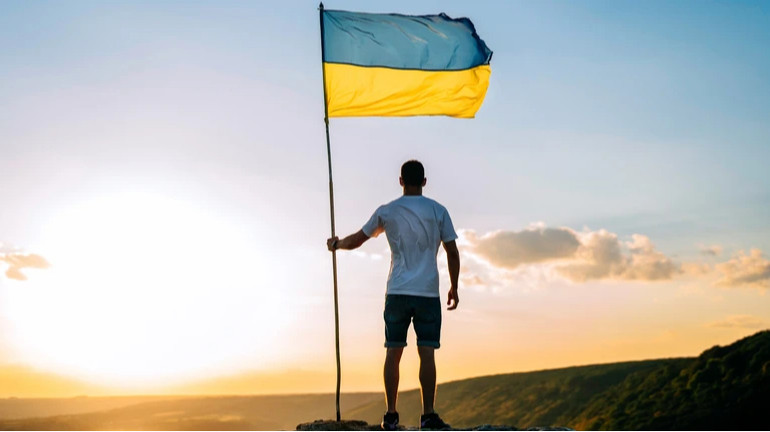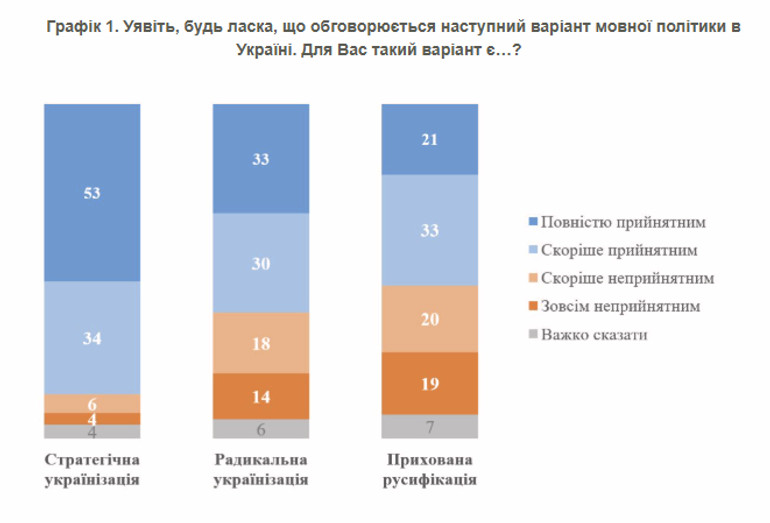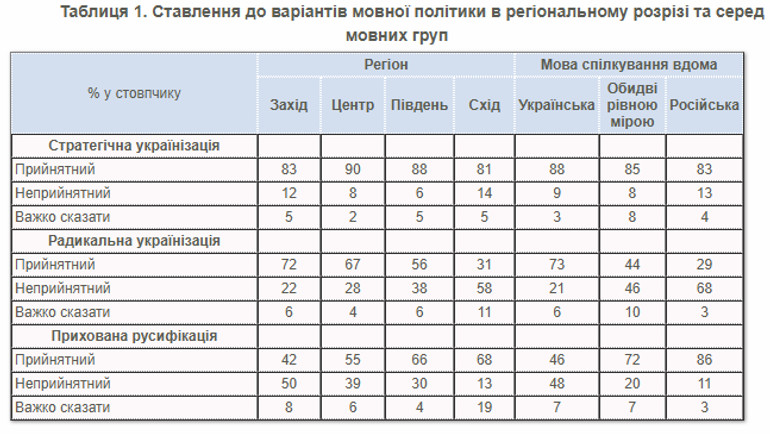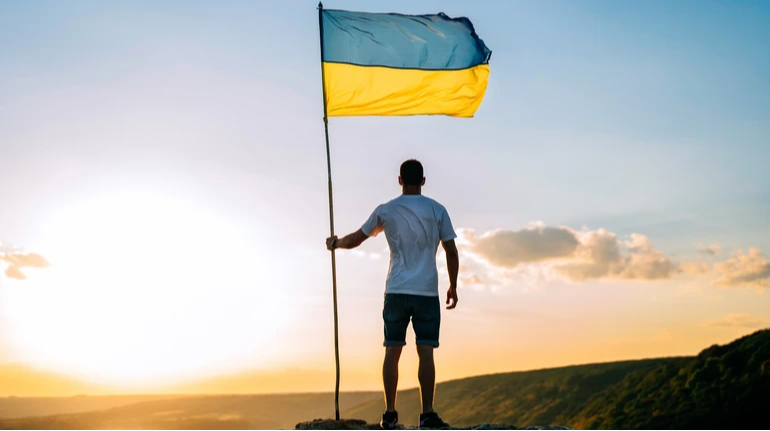“
 Soclogists have found out the attitude of Ukrainians to different variants of language policy
Soclogists have found out the attitude of Ukrainians to different variants of language policy
Photo: KOHANOVA1991/Depositphotos
At the same time, the greatest support has gentle Ukrainianization – this approach is fully or partially supported by 87% of citizens. In this case, more than half (53%) calls acceptable elements of hidden Russification.
This is evidenced by results pollwhich was conducted by experts of the Kiev International Institute of Sociology (KIIS).
In the course of the study, participants described three variants of language policy without calling their name. Each respondent was read only one random approach.
Subsequently, the respondents asked their attitude to the described measures of strategic (gentle), radical Ukrainization or hidden Russification.
Sociologists noted that All options can get approval from a formal majority. Therefore, 63% of respondents called the fully or partially acceptable policy of radical Ukrainization, 87% – gentle, and another 53% – hidden Russification.
Simultaneously The most negative attitude The participants of the survey expressed on hidden Russification – more than a third (39%) recognized it completely or partially unacceptable.
Radical Ukrainianization policies received higher support, but here a third (32%) called it to some extent unacceptable.
Participants demonstrated the greatest proportion of approval as a strategic (gentle) Ukrainianization. In this case, every tenth surveyed (10%) considers it partially or completely unacceptable.
 Photo: screenshot/kIn
Photo: screenshot/kIn How did the residence and language group affect the answers? The authors of the study added that the option hidden Russification The majority of respondents in the East (68%) and south (66%) of Ukraine, despite the high proportion of opponents (13 and 30%, respectively).
At the same time, such policies are more positive about people who communicate at home mainly in Russian or equally Russian and Ukrainian.
“At the same time, among those who speak Ukrainian at home, thoughts are divided equally, that is, in the largest linguistic group there is a distinct resistance of hidden Russification”– they say in KIM.
According to experts, the option radical Ukrainization It has a reverse trend – it was more often approved by the interviewed from the West (72%) and the Center (67%). At the same time, the inhabitants of the south demonstrated tangible resistance, and in the east were often considered unacceptable.
Participants who communicate in Ukrainian at home more often supported such a policy, and those who use Russian were rejected as unacceptable. At the same time, thoughts were divided equally among the respondents who use both languages in everyday life.
 Photo: screenshot/kIn
Photo: screenshot/kIn Absolute support for residents of all regions and language groups has received an option strategic Ukrainianization, Researchers emphasized.
”This option is not only the most support at the national level, but also provides consensus between regions and between language groups of Ukraine “, – the authors of the survey explained.
The studies were conducted during September 2-14, 2025 by telephone interviews. In general, experts interviewed 2012 Ukrainians living in the controlled territory.
In the course of “strategic Ukrainianization”, which can also be called gentle, the authors understand the strengthening of the position of the Ukrainian language, but without pressure on the use of Russian.

Elements strategic Ukrainianization The following abstracts were defined:
- Ukrainian is the only state and official language;
- the main language of education in schools, etc. – Ukrainian;
- Ordinary citizens can speak Russian without pressure or condemnation, if they want or are used to it;
- The gradual spread of Ukrainian, in particular because of more quality content on the Internet in this language, publishing books, etc. is encouraged.
KIIS specialists “Radical Ukrainianization“Describe as a policy of stigmatization and pressure on Russian -speaking citizens for the transition to Ukrainian, as well as the prohibition of using Russian even at the household level. Elements of this approach imply the assertion that:
- Ukrainian is the only state and official language;
- the main language of education in schools, etc. – Ukrainian;
- Russian is forbidden to use everywhere, in particular in household, family and friendly communication;
- All Russian -speaking are forced to completely switch to Ukrainian.

Policy ”hidden Russification“Provides an alleged democratic approach that actually strengthens and spreads Russian at different levels. For participants, elements of hidden Russification were described as:
- The Ukrainian language is the only state, but Russian can be used in the official sphere in regions where the majority of the population wants it;
- the language of education in schools, etc. – at the choice of parents, in particular it can be Russian;
- Citizens can speak Russian without pressure or condemnation if they want it or are used to it;
- The gradual spread of Ukrainian, in particular because of more quality content on the Internet in this language, publication of books, etc. is encouraged.
Earlier the Razumkov Center survey showedthat in 2024, 78% of Ukrainians called the state language their native language – a quarter more than it was in 2006.

”, – WRITE: www.pravda.com.ua
 Soclogists have found out the attitude of Ukrainians to different variants of language policy
Soclogists have found out the attitude of Ukrainians to different variants of language policy
Photo: KOHANOVA1991/Depositphotos
At the same time, the greatest support has gentle Ukrainianization – this approach is fully or partially supported by 87% of citizens. In this case, more than half (53%) calls acceptable elements of hidden Russification.
This is evidenced by results pollwhich was conducted by experts of the Kiev International Institute of Sociology (KIIS).
In the course of the study, participants described three variants of language policy without calling their name. Everyone Only one random approach was read by the respondent.
Subsequently, the respondents asked their attitude to the described measures of strategic (gentle), radical Ukrainization or hidden Russification.
Sociologists noted that All options can get approval from a formal majority. Therefore, 63% of respondents called the fully or partially acceptable policy of radical Ukrainization, 87% – gentle, and another 53% – hidden Russification.
Simultaneously The most negative attitude The participants of the survey expressed on hidden Russification – more than a third (39%) recognized it completely or partially unacceptable.
Radical Ukrainianization policies received higher support, but here a third (32%) called it to some extent unacceptable.
Participants demonstrated the greatest proportion of approval as a strategic (gentle) Ukrainianization. In this case, every tenth surveyed (10%) considers it partially or completely unacceptable.
 Photo: screenshot/kIn
Photo: screenshot/kIn How did the residence and language group affect the answers? The authors of the study added that the option hidden Russification The majority of respondents in the East (68%) and south (66%) of Ukraine, despite the high proportion of opponents (13 and 30%, respectively).
At the same time, such policies are more positive about people who communicate at home mainly in Russian or equally Russian and Ukrainian.
“At the same time, among those who speak Ukrainian at home, thoughts are divided equally, that is, in the largest linguistic group there is a distinct resistance of hidden Russification”– they say in KIM.
According to experts, the option radical Ukrainization It has a reverse trend – it was more often approved by the interviewed from the West (72%) and the Center (67%). At the same time, the inhabitants of the south demonstrated tangible resistance, and in the east were often considered unacceptable.
Participants who communicate in Ukrainian at home more often supported such a policy, and those who use Russian were rejected as unacceptable. At the same time, thoughts were divided equally among the respondents who use both languages in everyday life.
 Photo: screenshot/kIn
Photo: screenshot/kIn Absolute support for residents of all regions and language groups has received an option strategic Ukrainianization, Researchers emphasized.
”This option is not only the most support at the national level, but also provides consensus between regions and between language groups of Ukraine “, – the authors of the survey explained.
The studies were conducted during September 2-14, 2025 by telephone interviews. In general, experts interviewed 2012 Ukrainians living in the controlled territory.
In the course of “strategic Ukrainianization”, which can also be called gentle, the authors understand the strengthening of the position of the Ukrainian language, but without pressure on the use of Russian.

Elements strategic Ukrainianization The following abstracts were defined:
- Ukrainian is the only state and official language;
- the main language of education in schools, etc. – Ukrainian;
- Ordinary citizens can speak Russian without pressure or condemnation, if they want or are used to it;
- The gradual spread of Ukrainian, in particular because of more quality content on the Internet in this language, publishing books, etc. is encouraged.
KIIS specialists “Radical Ukrainianization“Describe as a policy of stigmatization and pressure on Russian -speaking citizens for the transition to Ukrainian, as well as the prohibition of using Russian even at the household level. Elements of this approach imply the assertion that:
- Ukrainian is the only state and official language;
- the main language of education in schools, etc. – Ukrainian;
- Russian is forbidden to use everywhere, in particular in household, family and friendly communication;
- All Russian -speaking are forced to completely switch to Ukrainian.

Policy ”hidden Russification“Provides an alleged democratic approach that actually strengthens and spreads Russian at different levels. For participants, elements of hidden Russification were described as:
- The Ukrainian language is the only state, but Russian can be used in the official sphere in regions where the majority of the population wants it;
- the language of education in schools, etc. – at the choice of parents, in particular it can be Russian;
- Citizens can speak Russian without pressure or condemnation if they want it or are used to it;
- The gradual spread of Ukrainian, in particular because of more quality content on the Internet in this language, publication of books, etc. is encouraged.
Earlier the Razumkov Center survey showedthat in 2024, 78% of Ukrainians called the state language their native language – a quarter more than it was in 2006.

